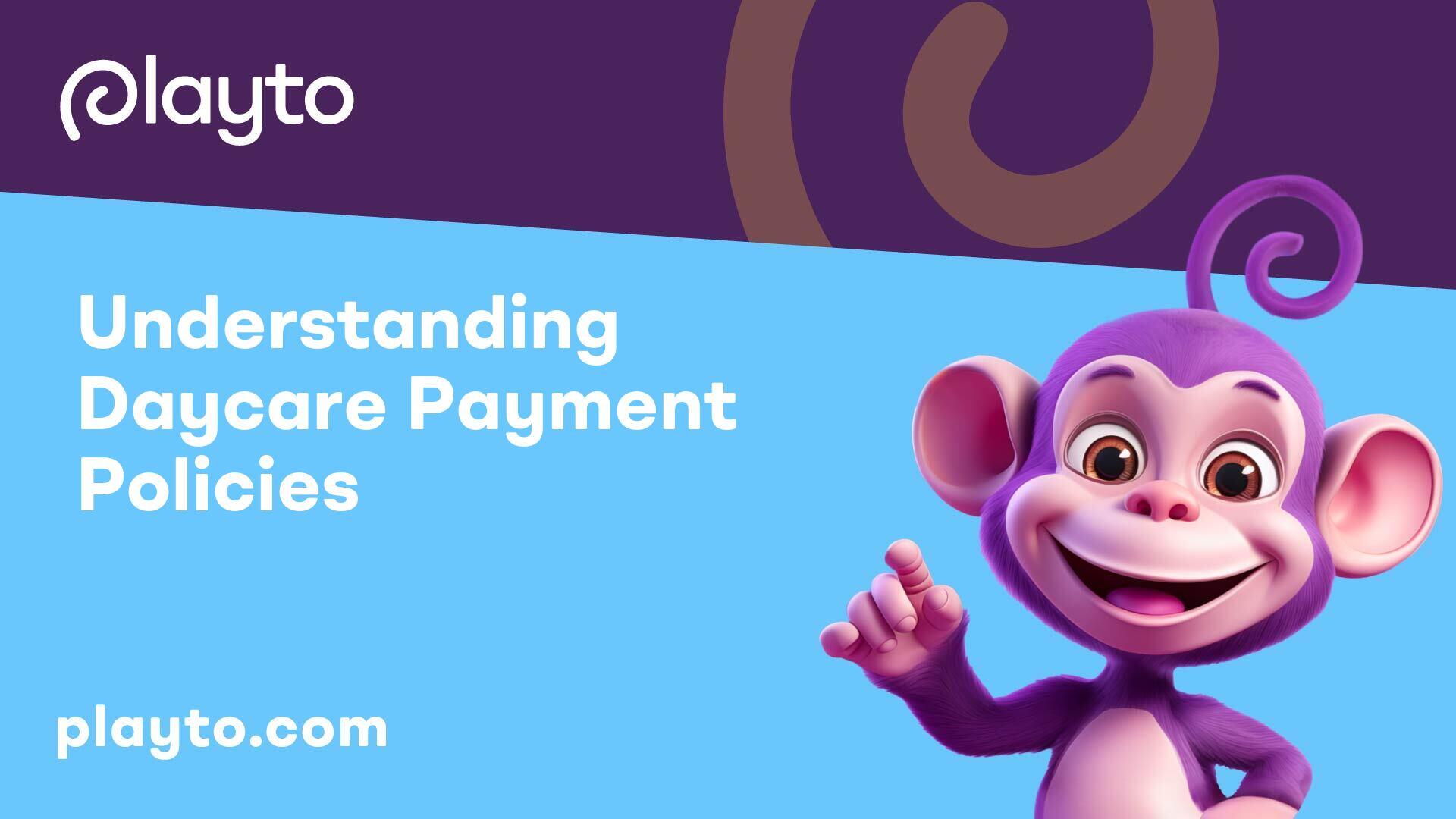
Understanding Daycare Payment Policies
When navigating the realm of daycare services, it is crucial to comprehend the various payment requirements and additional fees associated with childcare. These policies play a pivotal role in ensuring the smooth operation of daycare facilities and meeting the financial needs of both providers and parents.
Overview of Payment Requirements
In most daycare establishments, parents are typically required to pay full tuition regardless of their child's attendance, even if the child is sick. This practice aims to reserve the child's spot in the daycare program and maintain consistency in revenue streams. Understanding and adhering to these payment requirements is essential for parents to secure their child's place within the daycare setting.
Types of Additional Fees
Daycares often implement various additional fees beyond basic tuition to cover expenses related to certain activities and supplies. These fees can include annual registration fees, annual supply/activity fees, and summer activity fees, ranging from $75 to $200 depending on the child's age. The breakdown of these additional fees ensures that the daycare can provide enriching experiences and resources for the children under their care.
Some daycare facilities incorporate fundraising activities and extra charges for specialized programs such as music, Spanish lessons, cooking classes, dance sessions, or soccer programs into their tuition fees. While some parents may find these extra fees burdensome, others view them as part of the daycare's operational model [2]. Understanding the rationale behind these additional charges can help parents make informed decisions about the daycare services they choose for their children.
By grasping the intricacies of daycare payment policies and the types of additional fees that may be involved, parents can better navigate the financial aspects of childcare and select a daycare provider that aligns with their preferences and financial considerations. Clear communication between parents and daycare administrators regarding payment requirements can lead to a harmonious relationship built on transparency and mutual understanding.

Activity Fees and Fundraisers
In the realm of daycare operation, it's common for establishments, regardless of profit status, to incorporate various additional fees to cover diverse activities and supplies. Such fees can include annual registration fees, annual supply/activity fees, and summer activity fees, typically ranging from $75 to $200 depending on the child's age. These fees encompass expenses related to supplies, field trips, and engaging summer activities for the children.
Inclusion in Tuition
Daycares may choose to include activity fees within the regular tuition structure, simplifying the payment process for parents. By integrating these fees, families are relieved of the need to manage separate payments and can better plan financially for their child's daycare expenses. This consolidated approach enhances transparency and prevents confusion regarding the breakdown of fees.
Impact on Parents
Parents at daycares that levy additional fees for extracurricular activities such as soccer, gymnastics, and dance may face challenges if their child attends part-time and misses out on desired classes due to scheduling constraints. While the provision of such classes can be appreciated, the feasibility of participation may become an issue, especially for children with restricted attendance.
For daycares offering optional activities like dance classes, karate, and summer camp, parents may encounter separate payment requirements for participation. Although some parents may initially question the added cost, many ultimately value the enriching experiences these activities provide for their children, recognizing the intrinsic benefits outweighing the financial considerations.
Understanding the financial implications of activity fees and fundraisers in daycare settings sheds light on the holistic approach to childcare provision. By aligning these fees with parental needs and child development opportunities, daycares can strike a balance between financial sustainability and enriching experiences for the little ones under their care.

Late Payment Penalties
In daycare settings, late payment fees are applied when parents fail to pay tuition on time, ensuring the smooth operation of the facility and its services. Clear communication regarding due dates and late fees is crucial in the payment policy to avoid misunderstandings and ensure financial sustainability.
Fees for Tardiness
Late payment penalties in childcare centers can vary but commonly include fines for each week the bill remains unpaid. For instance, a late fee of $45 per week overdue may be imposed to encourage prompt payments and maintain the financial health of the daycare facility. It is advisable for parents to be aware of these penalties and prioritize timely payments to avoid additional charges.
Importance of On-Time Payments
Prompt payment of tuition is essential for the smooth running of daycare operations. Timely payments allow childcare providers to maintain necessary resources, staff, and facilities to provide quality care for children. Delays in payments can disrupt the financial stability of the daycare center, impacting its ability to deliver consistent services and support.
By emphasizing the significance of on-time payments, daycare facilities can ensure a sustainable financial model that benefits both the daycare center and the families it serves. Parents play a vital role in upholding the payment policies to support the overall functioning and continuity of quality care provided by the daycare facility.
Drop-Off and Pick-Up Fees
In the realm of daycare policies, understanding the structure of drop-off and pick-up fees is essential for parents to plan childcare arrangements effectively. These fees are designed to address the varying needs of families and ensure the smooth operation of the childcare center. Here, we delve into how drop-off and pick-up fees are structured and their implications.
Addressing Parental Needs
Childcare centers commonly implement pick-up and drop-off fees to accommodate the diverse scheduling demands of parents. These fees serve to address the inconvenience caused by early or late childcare needs, offering flexibility while also maintaining operational efficiency.
For parents requiring extended care outside the standard operating hours, childcare centers often charge after-hour care fees. This ensures that caregivers are compensated for their additional time and resources, preventing disruptions to the daily routines of both staff and children. Transparent communication of these premium prices in advance is crucial for fostering a collaborative relationship between parents and the daycare center.
Charges for Extended Care
In cases where parents exceed the designated pick-up times, childcare facilities may apply late fees to discourage tardiness and ensure prompt retrieval of children. Typically, parents can expect to pay around $20 for every 30 minutes of excess childcare required. This measure serves not only as a deterrent for consistent tardiness but also as a means of incentivizing adherence to scheduled pick-up times.
Furthermore, some daycare centers offer extended hours to cater to the needs of working parents with shifted schedules. By allowing drop-offs well before the standard service hours, these facilities accommodate the diverse needs of families and mitigate the likelihood of late pick-ups and associated fees. This flexibility reduces the stress on parents and ensures the smooth operation of the daycare center by avoiding disruptions in staffing schedules.
Childcare providers emphasize the importance of timely pick-ups as a collective responsibility. Consistent lateness not only disrupts the center's operational efficiency but can also lead to financial penalties or exclusion from the facility, ultimately affecting the well-being of the children and staff. Therefore, adherence to agreed-upon pick-up times is crucial in fostering a harmonious relationship between parents and the daycare center.
Registration and Onboarding Fees
When considering childcare options, understanding the daycare enrollment policies is crucial. One significant aspect of the enrollment process is the registration and onboarding fees. These fees play a key role in the initial setup and orientation of new students. Let's explore the initial enrollment costs and the inclusions in the fee structure.
Initial Enrollment Costs
Onboarding fees, also commonly referred to as registration fees, are essential for childcare centers to cover various costs associated with enrolling new students. These costs may include materials such as welcome packets, handbooks, T-shirts, and the addition of new contacts to management software. Typically, the onboarding fee is integrated into the initial tuition payment made upon enrollment.
It is important for daycare centers to establish fair enrollment costs by considering all operating expenses. These expenses may involve staff wages, rent, class supplies, insurance, and administrative costs. To set competitive and justifiable childcare tuition rates, conducting thorough research on the pricing strategies of other childcare centers in the region is essential.
Inclusions in the Fee Structure
A daycare fee structure is a comprehensive document that outlines all the fees a childcare center charges parents for the services provided. This structure typically includes various fees such as child care tuition fees, additional meal & snack fees, special activity fees, transportation fees, night care fees, drop-in/unscheduled care fees, early drop-off/late pick-up fees, late payment fees, and potential family discounts. By transparently listing these fees, daycare centers provide parents with a clear understanding of the financial obligations associated with enrolling their child in the facility.
Understanding the breakdown of registration and onboarding fees within the daycare fee structure is crucial for parents considering childcare options. By being aware of the initial enrollment costs and the components included in the fee structure, parents can make informed decisions about the financial aspects of enrolling their child in a daycare program.
Different Payment Methods
When it comes to managing payments in a daycare setting, providers offer various methods to accommodate the preferences and convenience of parents. Understanding the pros and cons of each payment method is essential for seamless transactions. Let's explore the common payment methods used in daycare establishments: cash, cheques, cards, and online payment options.
Cash, Cheques, and Cards
Cash Payments
Cash payments may seem straightforward, but they can introduce complexities due to tracking and security concerns. While cash provides immediate funds, it requires careful handling to ensure accurate record-keeping and security. Parents opting for cash payments should maintain receipts for transparency and tracking purposes.
Cheque Payments
Cheques remain a popular choice for many daycare providers as they offer a balance between banking convenience and the simplicity of paper transactions. However, cheques come with their own set of challenges, such as the time taken for processing and the risk of bounced cheques. Providers accepting cheques should establish clear protocols for processing payments and address any cheque-related issues promptly.
Card Payments
Credit and debit card payments are widely preferred by parents for their convenience and security. Offering card payment options can set daycare providers apart from the competition and cater to the needs of tech-savvy parents. Despite the advantages, providers should consider transaction fees and setup requirements when implementing card payment systems. Ensuring secure card transactions and compliance with payment regulations is paramount for maintaining trust with parents.
Online Payment Options
Advantages of Online Payments
Online payment methods, including e-transfers, PayPal, credit cards, and direct debit, are gaining popularity in daycare centers due to their convenience for both customers and internal processes. By offering online payment options, daycare providers can streamline transactions and enhance customer experience. The efficiency of online payments can benefit both providers and parents, leading to smoother financial transactions and improved record-keeping.
Considerations for Online Payments
While online payments offer numerous advantages, providers should be mindful of potential drawbacks. Factors such as transaction fees, setup costs, and cybersecurity risks require careful consideration when integrating online payment systems. Prioritizing data security and selecting reputable payment processors are critical for safeguarding sensitive financial information and maintaining trust with parents.
In the digital age, offering a diverse range of payment methods, including cash, cheques, cards, and online options, can cater to the varied preferences of parents and enhance the operational efficiency of daycare businesses. By understanding the nuances of each payment method and addressing the associated challenges, daycare providers can create a seamless payment experience for families while optimizing financial management processes.
Importance of Fee Transparency
In the realm of DayCare Policies, transparency in fee structures plays a crucial role in fostering trust between childcare providers and parents. Being upfront about rates and charges not only ensures clarity but also helps in maintaining financial stability for both parties involved.
Publishing Rates
Childcare providers are encouraged to publish their rates openly and clearly for parents to access easily. By making rates readily available, parents can make informed decisions about the financial commitment required for daycare services. Transparent communication regarding fees fosters a sense of trust and accountability between the daycare center and families.
To provide a comprehensive understanding of daycare fees, it is recommended to break down the costs into categories such as tuition, registration fees, activity fees, and any additional charges that may apply. Ensuring that the fee structure is clearly outlined can help avoid misunderstandings and disputes in the future, promoting a harmonious relationship between the daycare center and parents.
Financial Management Tips
Effective financial management is essential for daycare centers to operate efficiently and sustainably. It is paramount for daycare administrators to keep track of payments, expenses, and revenue streams to ensure the financial health of the facility. Implementing sound financial practices can prevent cash flow issues and facilitate smooth operations.
To streamline payment processes and improve financial accountability, many daycare centers have adopted electronic payment options. Accepting electronic payments not only simplifies transactions for families but also provides administrators with real-time insights into payment statuses. Automating payment tracking can help reduce the administrative burden associated with managing multiple payment methods.
Maintaining accurate and detailed invoices is another key aspect of effective financial management in daycare centers. Detailed invoices help in preventing discrepancies and errors in billing, ensuring that all charges are accurately recorded and communicated to parents. By keeping clear and precise records, daycare centers can enhance transparency and build trust with families.
In conclusion, fee transparency is a cornerstone of a successful daycare operation. By openly publishing rates and implementing sound financial management practices, daycare providers can establish trust, promote accountability, and ensure long-term financial sustainability in their facilities.
Handling Late Pick-Up Situations
When it comes to daycare operations, handling late pick-up situations is a significant aspect of ensuring the smooth functioning of the facility and the well-being of the children. Daycare centers establish specific late pickup policies to address tardiness and establish clear guidelines for parents regarding punctuality.
Late Pickup Policies
Late pickup policies can vary among daycare facilities, with many institutes implementing clear rules and consequences to manage tardiness effectively. In cases where parents exceed the agreed-upon pick-up time, fees are often charged to compensate for the additional care provided by the staff.
Some daycare centers may start charging fees from the first minute of lateness. For instance, a common practice is to charge $10 for the first minute of tardiness and then add an extra dollar for each subsequent minute. These policies are put in place to encourage parents to arrive on time and respect the operational hours of the daycare center.
Consequences of Tardiness
In cases of repeated or significant lateness in picking up a child from daycare, the consequences can extend beyond financial penalties. Some daycare facilities have strict policies that involve more severe actions when tardiness becomes a recurring issue.
In extreme cases, where parents consistently fail to pick up their child on time, daycare centers have protocols to escalate the situation. This may involve contacting emergency contacts listed by the parents or even contacting authorities like Child Protective Services (CPS) to ensure the safety and well-being of the child.
It's important for parents to understand and adhere to the late pickup policies set forth by daycare centers to maintain a harmonious environment for all children and staff. By communicating clearly about expectations and consequences related to tardiness, daycare facilities can ensure the safety and welfare of the children under their care while promoting a culture of respect for time and boundaries.
References
[2]:
[3]:
[4]:
[5]:
[6]:
[7]:
